Table of Contents
Get started with MyPerfectResume today!
- Build a resume on any device
- Pick an ATS-friendly template
- Tailor with AI copy suggestions
Why this resume works
- Quantifies accomplishments: Incorporating measurable accomplishments like a 20% reduction in patient wait times and over 500 eye exams demonstrates significant contributions to healthcare efficiency.
- Highlights industry-specific skills: By emphasizing healthcare skills such as medical records management and eye examination support, the applicant aligns their experience with skills needed for specialized roles in ophthalmology.
- Uses action-oriented language: Using action verbs like “managed,” “trained,” and “improved,” the applicant’s resume effectively conveys proactive contributions in healthcare settings.
More Ophthalmology Assistant Resume Examples
Take a look at our ophthalmology assistant resume examples to see the best ways to highlight your patient care, technical, and administrative skills. These medical resume examples will help you create a resume that stands out to hiring managers in your field.
Ophthalmic Technician
Why this resume works
- Centers on academic background: Academic credentials, like a master’s degree in health sciences, showcase the applicant’s dedication to learning and a strong educational foundation.
- Puts skills at the forefront: By placing important skills at the forefront, such as patient care and diagnostic testing, the resume follows a skills-based resume format that highlights core competencies.
- Shows digital literacy: The inclusion of electronic health records skills emphasizes digital literacy, aligning with computer skills needed for modern healthcare environments.
Medical Assistant
Why this resume works
- Includes a mix of soft and hard skills: Mixing technical expertise with strong interpersonal skills, the applicant effectively manages medical tasks while improving patient relations and operational efficiency simultaneously.
- Points to measurable outcomes: By noting a 15% reduction in supply costs, the applicant’s ability to streamline processes and deliver tangible improvements becomes clear.
- Demonstrates language abilities: Language skills in Spanish, French, and German improve the applicant’s capacity for cross-cultural interactions within diverse healthcare environments.
Optometric Assistant
Why this resume works
- Focuses on work history: Using a chronological resume format, the applicant effectively details extensive work history and career growth, starting as a vision care coordinator and advancing to optometric assistant.
- Lists relevant certifications: Listing certifications like certified paraoptometric technician reflects the applicant’s dedication to maintaining expertise in vision care and continuous professional development.
- Showcases impressive accomplishments: Highlighting major accomplishments, like redesigning patient intake processes, shows significant enhancements in operational efficiency with measurable impacts on workflow improvements.
Ophthalmology Assistant Resume Template (Text Version)
Min Miller
Los Angeles, CA 90012
(555)555-5555
Min.Miller@example.com
Skills
- Patient care
- Eye examination support
- Medical records management
- Inventory control
- Appointment scheduling
- Billing administration
- Staff training
- Patient communication
Languages
- Spanish – Beginner (A1)
- Mandarin – Intermediate (B1)
- French – Beginner (A1)
Professional Summary
Dedicated Ophthalmology Assistant with 6 years in patient care. Proven expertise in eye exams, records management, and improving patient satisfaction. Skilled in training staff and streamlining clinic operations.
Work History
Ophthalmology Assistant
Vision Care Center – Los Angeles, CA
January 2023 – August 2025
- Assisted in 500+ eye exams & treatments
- Maintained patient records with 99% accuracy
- Improved patient wait times by 20%
Medical Office Assistant
Greenfield Hospital – Los Angeles, CA
January 2020 – December 2022
- Supported 10+ doctors & 40+ patients/day
- Managed medical supplies inventory
- Trained 5 new staff monthly
Healthcare Assistant
Meadowbrook Clinic – Lakeside, CA
January 2017 – December 2019
- Facilitated patient appointments scheduling
- Reduced billing errors by 15%
- Conducted patient follow-ups enhancing satisfaction
Certifications
- Certified Ophthalmic Assistant – American Academy of Ophthalmology
- Medical Office Administration Certification – Health Science Institute
- Patient Care Technician Certification – National Healthcareer Association
Education
Master’s of Science Health Sciences
University of California, San Francisco San Francisco, CA
July 2017
Bachelor of Science Biology
University of California, Berkeley Berkeley, CA
July 2015
Related Resume Guides
- Clinical Documentation Improvement Specialist
- Clinical Project Manager
- Clinical Research Assistant
- Clinical Trial Associate
- Coding Specialist
- Dermatologist
- Dialysis Technician
- Doctor
- Electrocardiograph Technician
- Emergency Department Technician
- Emergency Room Registration Clerk
- Equipment Technician
- Health Information Technician
- Hospital Administrator
- Hospital Volunteer
- Intake Coordinator
- Intensive Care Physician
- Medical Laboratory Technologist
- Medical Records Specialist
- Medical Representative
- Medical Research Assistant
- Midwife
- MRI Technologist
- Neurosurgeon
- Nuclear Medicine Technologist
- OB-GYN Medical Assistant
- Ophthalmologist
- Optometrist
- Orthopedic Surgeon
- Pediatric Assistant
- Pediatrician
- Physician
- Physician Assistant
- Podiatrist
- Psychiatrist
- Radiologist
- Radiology Technician
- Resident Medical Officer
- Respiratory Therapist
- Speech Language Pathologist
- Surgeon
- Surgery Scheduler
- Ultrasound Technician
Advice for Writing Your Ophthalmology Assistant Resume
Discover our tailored tips on how to write a resume for this rewarding role, and learn how to highlight your skills in patient care and eye health. Dive into the specifics of resume writing for ophthalmology assistants to make sure you stand out from the crowd.
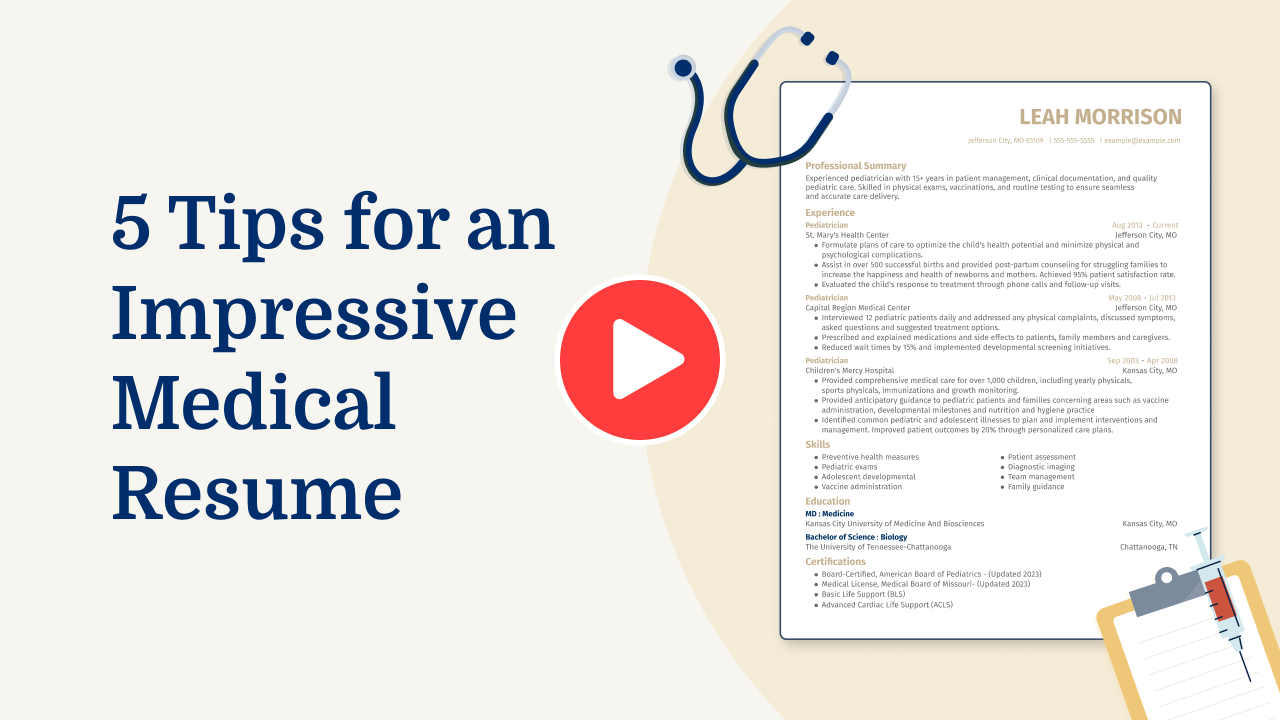
Write a strong professional summary
A professional summary on a resume serves as an introduction for hiring managers, providing a snapshot of your skills and accomplishments. You can decide whether to use a summary or a resume objective based on your experience level and career goals.
A professional summary is typically three to four sentences long, showcasing your experience, skills, and achievements. It’s best for experienced applicants who want to highlight their professional identity and value quickly. This section emphasizes “what I’ve accomplished.”
On the other hand, resume objectives are statements about career goals. They are ideal for entry-level applicants, those changing careers, or individuals with gaps in their employment history. Objectives focus on “what I aim to contribute.”
Next, we’ll provide examples of both summaries and objectives tailored for different industries and levels of experience. See our library of resume examples for additional inspiration.
Ophthalmology assistant resume summary examples
Entry-level
Recent graduate with a Bachelor of Science in health sciences and an ophthalmic assistant certification. Eager to apply foundational skills in patient care, diagnostic testing, and administrative support within an eye care setting. Familiar with ophthalmic instruments and EMR systems, committed to learning new techniques to assist ophthalmologists effectively.
Mid-career
Ophthalmology assistant with over five years of experience in clinical and surgical environments. Proficient in conducting visual acuity tests, preparing patients for laser procedures, and maintaining sterile work areas. Recognized for excellent interpersonal skills and the ability to educate patients on post-procedure care. Certified in ocular coherence tomography (OCT) and known for supporting seamless clinic operations.
Experienced
Seasoned ophthalmology assistant specializing in pediatric eye care and complex surgical assistance. Possesses advanced certifications in optical coherence technology and cataract surgery support. Proven track record of improving patient satisfaction through personalized care plans and efficient workflow management. Skilled at training junior staff and collaborating closely with ophthalmologists to ensure comprehensive patient treatment.
Ophthalmology assistant resume objective examples
Recent graduate
Detail-oriented and eager recent graduate with a diploma in ophthalmic technology seeking an entry-level position as an ophthalmology assistant. Passionate about using academic knowledge and hands-on training to support patient care in a clinical setting, while learning from experienced professionals in the field.
Career changer
Dedicated professional transitioning into ophthalmology assistance, bringing strong interpersonal skills and experience in customer service. Committed to providing compassionate patient care and supporting eye specialists by efficiently handling administrative tasks and assisting with basic clinical procedures.
Specialized training
Ambitious individual with specialized training in optometric practices, aiming to start a career as an ophthalmology assistant. Excited to apply acquired skills in conducting preliminary eye tests and managing patient records, while advancing expertise through direct involvement in eye care services.
Use our AI Resume Builder to make your ophthalmology assistant resume stand out. You can easily pick a template and add your skills, making sure everything looks professional.
Include relevant certifications and training
Listing certifications and training for an ophthalmology assistant shows that you have the skills needed to help eye doctors and care for patients. These credentials prove you know how to use special tools and follow safety rules in a healthcare setting. Having a dedicated certifications section makes it easy for employers to see you’re qualified, especially in technical fields like eye care. Here are a few examples:
- Certified Ophthalmic Assistant (COA)
- Basic Life Support (BLS) Certification
- Certified Ophthalmic Technician (COT)
- Certified Ophthalmic Medical Technologist (COMT)
- OSHA Compliance Training
By showing you have the right certifications, you’re more likely to succeed as an ophthalmology assistant. Employers will trust that you’re prepared and knowledgeable about eye care tasks. This helps your resume stand out, making it clear you’re ready for the job.
Example of a certifications section
Certified Ophthalmic Assistant (COA)
Issued by: Joint Commission on Allied Health Personnel in Ophthalmology (JCAHPO)
Expires 2025
Basic Life Support (BLS) Certification
Issued by: American Heart Association
Expires 2024
Ophthalmic Scribe Certification (OSC)
Issued by: American Society of Ophthalmic Administrators (ASOA)
Issued 2021
Choose a polished and well-organized resume template that effectively showcases your skills and qualifications to stand out to hiring managers in your field.
Showcase your work experience
Showing your work experience on a resume is important because it helps employers understand what you’ve done before and how you can contribute in the future. For an ophthalmology assistant, it’s key to highlight roles where you’ve used skills like patient care, equipment handling, and supporting eye exams.
Make sure to list your jobs starting with the most recent one first so employers can easily follow your career path. When listing each job, start with the job title, then include the name of the place you worked, its location, and the dates you were there.
Use strong action words to describe what you did, for example, by saying “assisted in eye examinations” or “managed patient records.” Try to show results when possible; mention if you helped increase patient satisfaction or reduce appointment wait times through better schedule organization.
Remember to focus on responsibilities that are relevant to an ophthalmology assistant role. These might include helping patients understand procedures, maintaining sterile environments for tools and equipment, or collaborating closely with doctors during surgeries.
By clearly describing what you’ve accomplished using these skills and showing any improvements or successes from your past work, you’ll make it easy for employers to see why you’d be a great fit.
5 ophthalmology assistant work history bullet points
- Assisted in performing over 200 diagnostic tests per month, improving clinic efficiency by 15%
- Maintained and updated patient records for a caseload of 1500+ individuals, ensuring compliance with HIPAA regulations
- Facilitated preoperative assessments for surgical procedures, contributing to a 98% patient satisfaction rate
- Trained and supervised new staff members on equipment handling and safety protocols, reducing training time by 25%
- Coordinated with ophthalmologists to streamline appointment scheduling, resulting in a 20% decrease in patient wait times
Select a resume format that highlights your precision, patient care skills, and ability to manage clinical tasks efficiently.
Match your resume with the job description
Tailoring your resume to match job descriptions is essential because it helps you stand out to employers and successfully pass through applicant tracking systems (ATS). ATS software scans resumes for specific keywords and phrases from the job postings, ensuring only relevant applications reach hiring managers.
An ATS-friendly resume includes keywords and phrases that align with your skills. By using these terms, you increase your chances of catching the attention of hiring managers. For example, if you’re applying for an ophthalmology assistant role, ensure your resume reflects relevant skills and experiences.
For an ophthalmology assistant role, keywords often include patient intake, visual acuity testing, diagnostic imaging support, clinical assessments, and patient education. Using exact phrases from the job posting helps your resume pass ATS checks.
Incorporate these keywords naturally by connecting them to your responsibilities. For example, instead of writing “Assisted with patient care,” you could say “Performed visual acuity tests, assisted with diagnostic imaging, and provided patient education to support accurate assessments and effective treatment plans.” This approach ensures your resume is both keyword-rich and clearly demonstrates your contributions.
Targeted resumes tailored to specific jobs increase their compatibility with ATS systems. When you customize your resume, you maximize the likelihood that your application will reach a recruiter’s desk.
You can use our ATS Resume Checker to scan your resume for potential issues and receive on-the-spot feedback to improve your resume score.
FAQ
Do I need to include a cover letter with my ophthalmology assistant resume?
Yes, including a cover letter with your ophthalmology assistant resume can make a positive impression and set you apart from other applicants.
A well-crafted cover letter gives you the chance to highlight your specific skills, such as patient care or familiarity with diagnostic equipment, and explain why you’re passionate about ophthalmology.
For example, if the clinic specializes in cataract surgery or pediatric care, you can address how your background aligns with their focus or mission.
To streamline this process, consider using our Cover Letter Generator, which helps tailor your content while saving time and ensuring professionalism.
Additionally, reviewing relevant cover letter examples can inspire you to effectively present your experience in this specialized field.
How long should an ophthalmology assistant’s resume be?
For an ophthalmology assistant, a one-page resume is typically sufficient to showcase your key skills and experience. It should highlight your skill in assisting with eye examinations, handling patient records, and managing ophthalmic equipment.
If you have extensive experience or specialized certifications, a two-page resume might be appropriate. Just ensure that every detail included is relevant and adds value to your application, focusing on the most recent roles and achievements.
Explore our guide on how long a resume should be to determine the best length for your career stage and make sure you stand out.
How do you write an ophthalmology assistant resume with no experience?
To craft a resume with no experience for an ophthalmology assistant role, highlight transferable skills, education, and relevant hands-on training. Structuring these elements properly can make your application stand out to potential employers. Here are a few tips:
- Start with a strong summary: Write a brief statement highlighting your interest in ophthalmology and your ability to learn quickly. Mention relevant traits like attention to detail or excellent communication skills.
- Emphasize education and certifications: Include any coursework or certifications related to healthcare, biology, or medical assisting. If you’ve taken courses in anatomy or patient care, be sure to list them.
- Highlight transferable skills: Even without direct experience, skills like customer service, organization, or working in fast-paced environments are valuable. For example, mention experience handling sensitive information or managing schedules if you’ve done so before.
- Include volunteer work or internships: If you’ve volunteered at clinics, shadowed professionals, or participated in health-related programs, treat these as experience and describe what you learned.
When creating a resume with no experience in this field, tailor each section to show how your background makes you a strong applicant for the role of ophthalmology assistant.
Rate this article
Ophthalmology Assistant
Share this page
Additional Resources
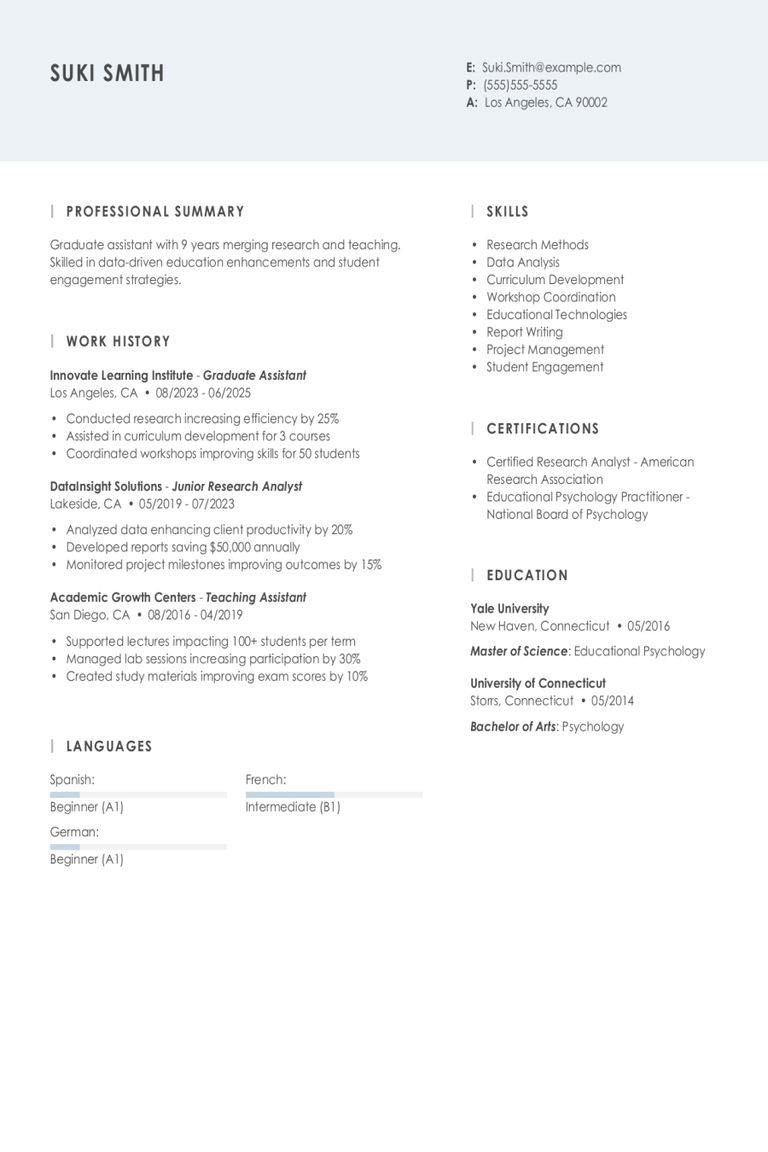
Graduate Assistant Resume Examples & Templates
Discover how graduate assistants can effectively showcase their teaching and research skills with our resume examples. Learn how to highlight your academic experience and multitasking abilities to stand out in
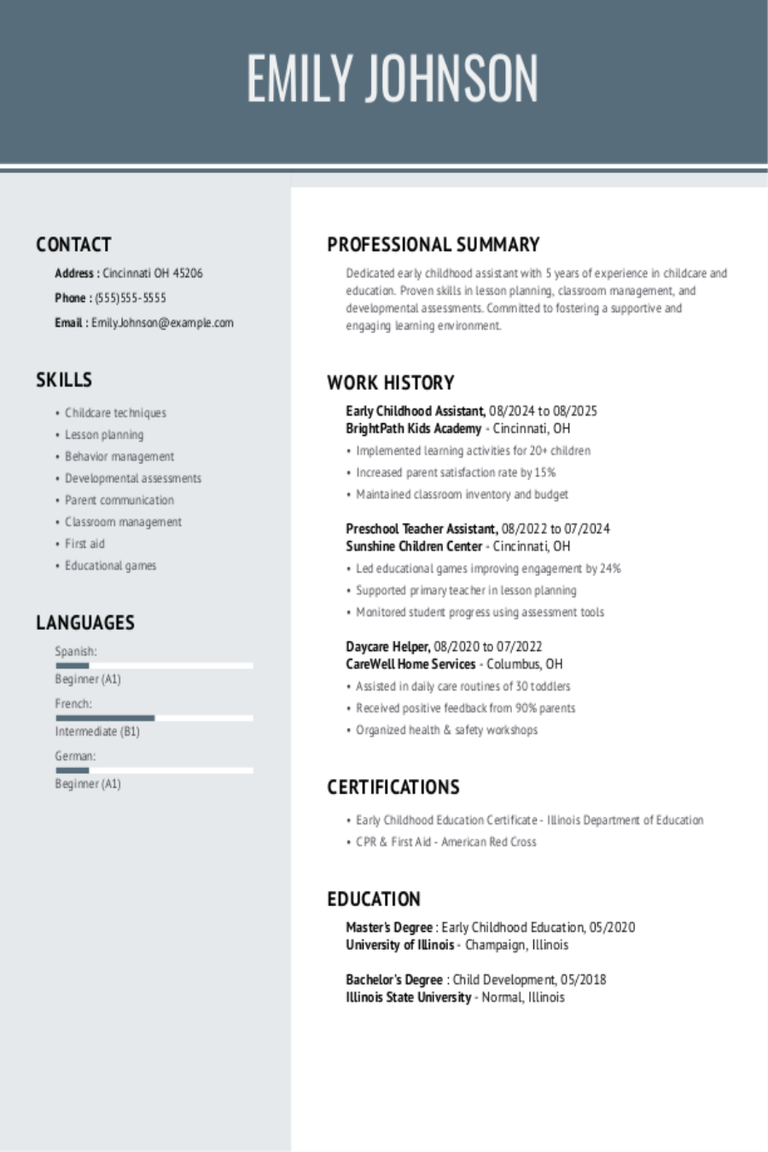
Early Childhood Assistant Resume Examples & Templates
Browse early childhood assistant resume examples to see how to highlight your experience nurturing young minds, creating a safe environment, and supporting teachers. Discover how to highlight your ability to
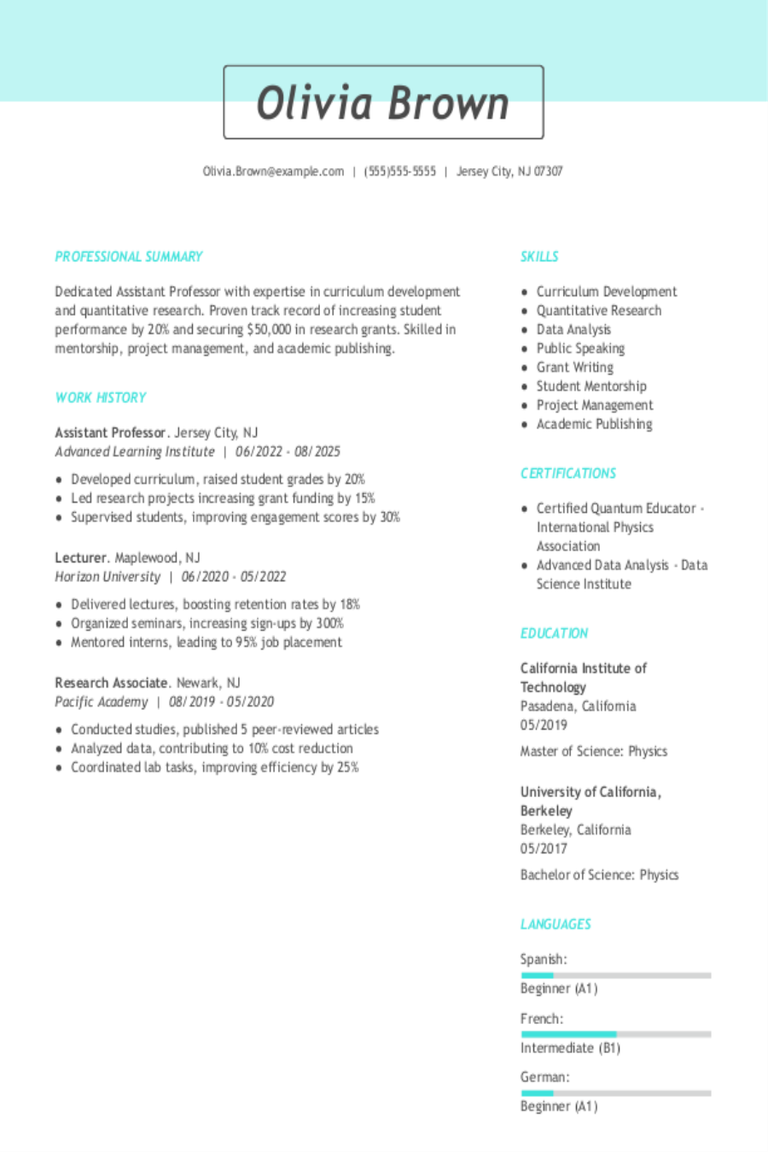
Assistant Professor Resume Examples & Templates
Explore assistant professor resume examples that highlight research expertise, teaching experience, and academic accomplishments. Learn effective ways to demonstrate your knowledge, organization, and ability to inspire students in the classroom.Build
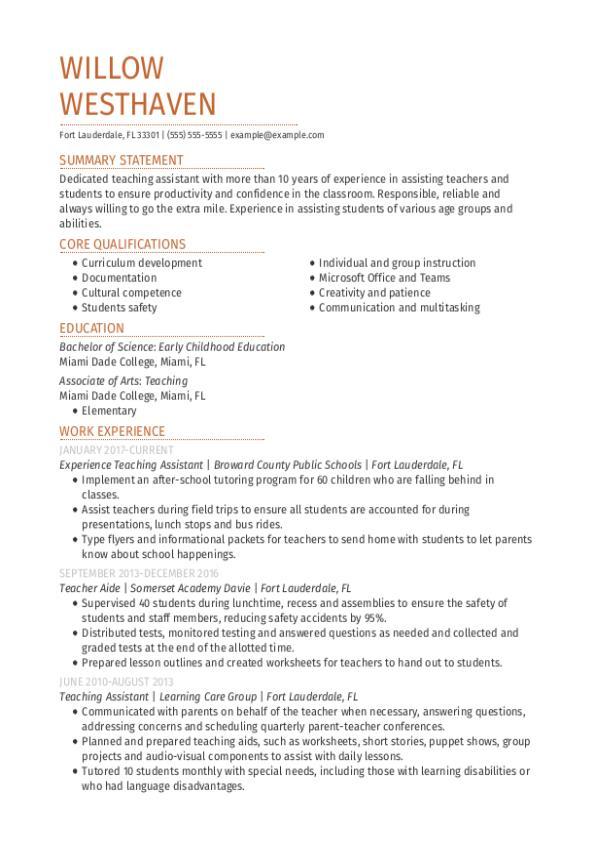
Teaching Assistant Resume Examples & Templates
Browse teaching assistant resume examples to see how to highlight your experience supporting classroom instruction, assisting teachers, and engaging with students. Use these samples and tips to showcase your experience,
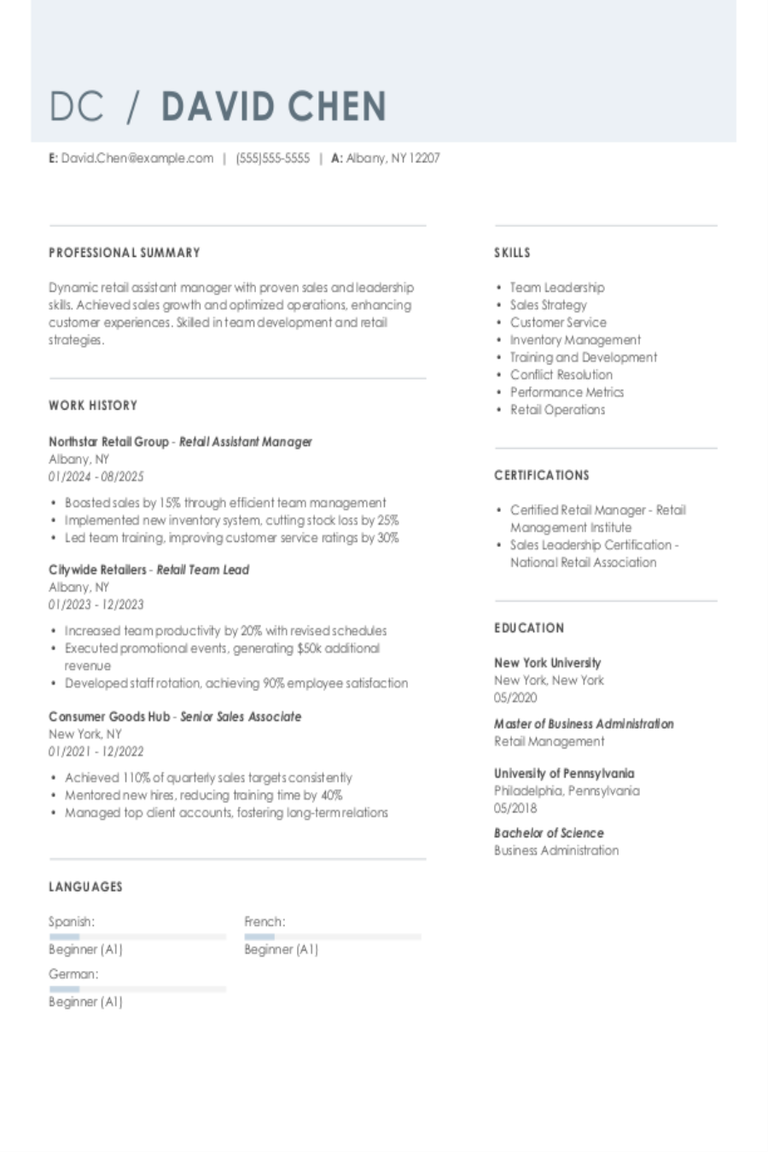
Retail Assistant Manager Resume Examples & Templates
Explore retail assistant manager resume examples to see how to highlight your experience handling customer service, managing inventory, and leading a team. Use these samples and tips to showcase your
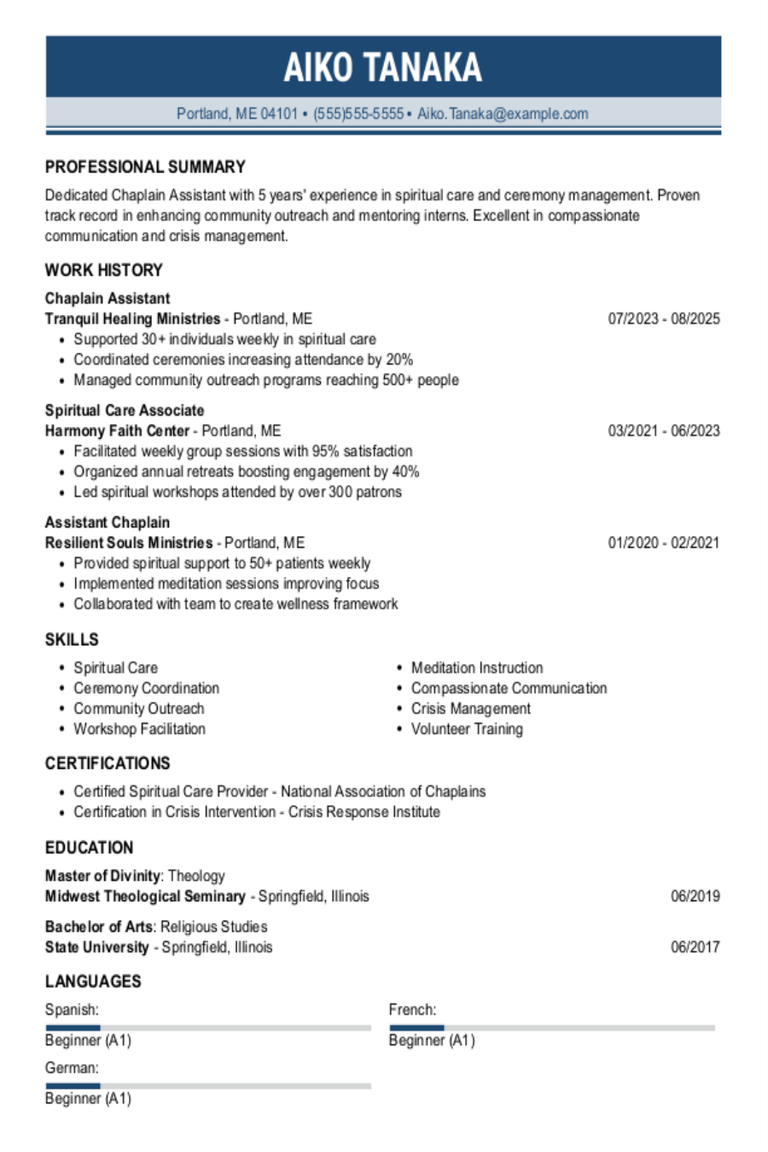
Chaplain Assistant Resume Examples & Templates
Explore chaplain assistant resume examples that emphasize experience supporting spiritual care and completing administrative tasks. These tips will help you showcase your compassion, organizational skills, and ability to assist in
